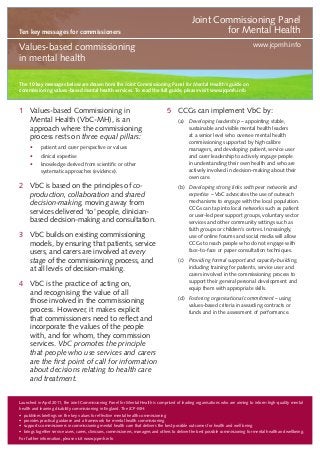
10 key messages on Values-based Commissioning in Mental Health
- 1. Ten key messages for commissioners Joint Commissioning Panel for Mental Health www.jcpmh.info Values-based commissioning in mental health The 10 key messages below are drawn from the Joint Commissioning Panel for Mental Health’s guide on commissioning values-based mental health services. To read the full guide, please visit www.jcpmh.info 1 Values-based Commissioning in Mental Health (VbC-MH), is an approach where the commissioning process rests on three equal pillars: • patient and carer perspective or values • clinical expertise • knowledge derived from scientific or other systematic approaches (evidence). 2 VbC is based on the principles of coproduction, collaboration and shared decision-making, moving away from services delivered ‘to’ people, clinicianbased decision-making and consultation. 3 VbC builds on existing commissioning models, by ensuring that patients, service users, and carers are involved at every stage of the commissioning process, and at all levels of decision-making. 4 VbC is the practice of acting on, and recognising the value of all those involved in the commissioning process. However, it makes explicit that commissioners need to reflect and incorporate the values of the people with, and for whom, they commission services. VbC promotes the principle that people who use services and carers are the first point of call for information about decisions relating to health care and treatment. 5 CCGs can implement VbC by: (a) Developing leadership – appointing stable, sustainable and visible mental health leaders at a senior level who oversee mental health commissioning supported by high calibre managers, and developing patient, service user and carer leadership to actively engage people in understanding their own health and who are actively involved in decision-making about their own care. (b) Developing strong links with peer networks and expertise – VbC advocates the use of outreach mechanisms to engage with the local population. CCGs can tap into local networks such as patient or user-led peer support groups, voluntary sector services and other community settings such as faith groups or children’s centres. Increasingly, use of online forums and social media will allow CCGs to reach people who do not engage with face-to-face or paper consultation techniques. (c) Providing formal support and capacity-building, including training for patients, service user and carers involved in the commissioning process to support their general personal development and equip them with appropriate skills. (d) Fostering organisational commitment – using values-based criteria in awarding contracts or funds and in the assessment of performance. Launched in April 2011, the Joint Commissioning Panel for Mental Health is comprised of leading organisations who are aiming to inform high-quality mental health and learning disability commissioning in England. The JCP-MH: • publishes briefings on the key values for effective mental health commissioning • provides practical guidance and a framework for mental health commissioning • supports commissioners in commissioning mental health care that delivers the best possible outcomes for health and well being • brings together service users, carers, clinicians, commissioners, managers and others to deliver the best possible commissioning for mental health and wellbeing. For further information, please visit www.jcpmh.info
- 2. Values-based commissioning in mental health Ten key messages for commissioners 6 To achieve these four key actions, VbC supports balanced decisionmaking within a framework of shared or negotiated values based on the premise of mutual respect and discussion. VbC recognises that it is not always possible to satisfy everyone’s expectations. However, it allows all individuals to actively engage in the process of commissioning and service development. 7 VbC supports outcomes based commissioning being underpinned by the principle that only the person using services or experiencing illness can truly attach value to health status. VbC is an approach, which delivers patient and user-focused services, improves costeffectiveness, and supports current mental health policy and guidance on achieving key outcome measures. 8 VbC supports the development of new relationships, more choice and control in public services, and innovation through patient and carer collaboration and engagement in the commissioning process which in turn supports implementation of the Government’s Personalisation agenda. 9 VbC supports the development of Payment by Results (PbR) through building on strengths, self management, the equality of relationships, recovery and social inclusion. PbR then has far wider impacts than just financial reward. 10 VbC can help achieve the six shared objectives aimed at improving mental health outcomes in the English mental health strategy: (a) More people will have good mental health – by capturing individual and community views and priorities, services are commissioned for public mental health and wellbeing. (b) More people with mental health problems will recover – VbC gives equal status to patient, service user and carer input, clinical expertise and formal evidence leading to services that better reflect people’s needs and therefore are more likely to help them recover. (c) More people with mental health problems will have good physical health – VbC encourages an integrated whole-person based approach and supports the commissioning of services, which focus on an individual’s physical, psychological, spiritual and social wellbeing. (d) More people will have a positive experience of care and support – services commissioned using VbC, reflect all aspects of an individual’s physical, psychological, spiritual and social wellbeing as important to their mental health. (e) Fewer people will suffer avoidable harm – greater ownership and collaboration in service development and commissioning using a VbC approach throughout the whole commissioning cycle will result in increased engagement of patients, service users and carers, particularly in the areas of monitoring and feedback on service performance. (f) Fewer people will experience stigma and discrimination – the long-term benefits of commissioning services which address patient, service user, and carer priorities and needs, is a greater focus on outcomes such as increased access to employment, education, training and recovery. This in turn can reduce social isolation and increase community engagement and participation reducing negative attitudes and stigma.
